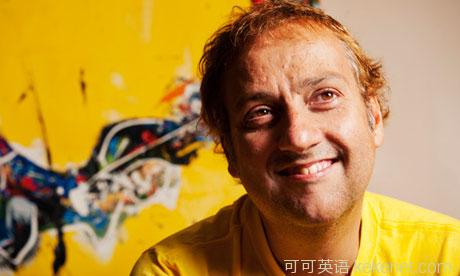(单词翻译:单击)

At 14 Albert Espinosa was a typical football obsessed teenager. He lived with his engineer father, housewife mother, sister and brother in Barcelona. "Like all adolescents," he tells me, "I hated my parents."
14岁时,阿尔伯特.埃斯皮诺萨是一个痴迷足球的典型少年。他和他的工程师父亲、家庭主妇母亲以及兄弟姐妹一起住在巴塞罗那。“像所有的青少年一样,”他对我说,“我恨我的父母。”
Then one day medics found osteosarcoma – a malignant bone tumour – in his leg. His chance of survival, his parents were told, was just 3% – odds so bad they were advised to take their son on holiday somewhere sunny and enjoy the last month of his life. The family packed up and set off for Menorca. "We got as far as the airport," he says, "before we decided to turn back and fight to overcome it."
然后有一天,医生在他的腿上发现骨肉瘤,恶性骨肿瘤。他的父母被告知他生存的几率只有3%,几率如此糟糕,他们被建议带他们儿子去一个阳光明媚的地方度假,享受他生命的最后一个月。家人们收拾好行囊,前往梅诺卡岛。“我们尽可能远离机场,”他说,“在我们决定回头争取战胜病魔之前。”
For the next decade Espinosa endured gruelling chemotherapy, had his leg amputated, lost a lung and had part of his liver removed. He made intense friendships, and watched 22 fellow cancer patients, often teenagers, die from the disease. Yet, extraordinarily, he remembers it as a happy period. By the time he was finally cured at 24, he had written a book, El Mundo Amarillo (The Yellow World), not about how to survive cancer, he insists, but about how to live.
接下来的十年埃斯皮诺萨忍受着痛苦的化疗,他的腿被截肢,失去了肺,部分肝脏被切除。他和22个癌症同伴建立了亲密的友谊,并照看着他们,往往是青少年死于这种疾病。然而,不同寻常的是,他将其视为一段快乐的时光。在24岁时,他终于治愈了,他写了一本书,El Mundo Amarillo(《泛黄的世界》),不是关于如何从癌症中求生存,他坚持,而是关于如何生活。
The book, which is being published for the first time in the UK, details the discoveries he made during his illness – including how to stay in touch with your inner 14-year-old, or contemplate your own death – which he believes can apply to life outside hospitals. The tone veers from humorous to just plain odd. It has sold more than a million copies and been published in 20 other countries.
这本书,正首次在英国出版,详细介绍了患病期间他的发现 - 包括如何与内心深处14岁的自己保持联系,或思考自己的死亡 - 他认为这可以适用于医院以外的生活。基调从幽默到只是平淡的叙述。书已经售出了超过一百万册,并在其他20个国家出版。
Now devoted readers send him thousands of emails a day, and some go further: he proudly shows me pictures on his mobile of women who have had quotations from the book (such as "Trust your dreams and they will come true") tattooed on their bodies.
现在关切的读者每天给他发送成千上万的电子邮件,一些更进一步:他骄傲给我展示他手机上的把书中引言进行纹身的女性照片(如“相信你的梦想,他们会成真”)。
Espinosa, 37, also wrote a Spanish television series, The Red Band Society, based on his hospital experiences. It focuses on the friendships he made in hospital with other young cancer patients (they formed a gang called the Eggheads). He tells me that the series and the book have prompted a 48% increase in visitors to children's cancer wards in Spain. Now it is being remade by Steven Spielberg for an English-speaking audience.
37岁的埃斯皮诺萨还写了一个西班牙语的电视剧,The Red Band Society,基于他的医院经历。它重点描述他在医院与其他年轻的癌症患者之间的友谊(他们形成了一个叫Eggheads的帮派)。他告诉我,该电视剧和书使得在西班牙儿童癌症病房的探望者增加了48%。现在它正由史蒂芬•斯皮尔伯格为英语观众而翻拍。
They may not have had a normal life, he says, but they soon lost their fear of death and knew how to have fun. "We didn't have motorbikes but we had wheelchairs. We couldn't go to discos but we had five floors of a hospital to charge through.
他们可能没有一个正常的生活,他说,但他们很快就不再对死亡恐惧,知道如何行乐。“我们没有摩托车,但我们有轮椅。我们不能去迪斯科舞厅,但我们有五层楼的医院来穿梭。
When I ask him whether he ever felt like giving up, he says no, because the gang "had a pact that if one of us were to die we would share out their life". Each made a list of the wishes they wanted to fulfil if they recovered, and when a friend died, the others would try to carry them out. Today, he says, he has the responsibility for living not just his own life, but the desires and dreams of 3.7 of his friends: "Bit by bit, I am trying to fulfil them."
当我问他是否曾想过放弃,他说没有,因为帮会“有一个协议,如果我们中有一个人死了,我们要过完他们的生活”。每个人都列了一个清单,里面是如果他们康复后想实现的愿望,当一个朋友死了,其他人会尝试将愿望实现。今天,他说,他有责任不只是为他自己而活,而是为3.7个朋友的愿望和梦想而活:“一点一点,努力实现梦想。”
His own wishes helped him too. When he was finally told he was cured, he spent a year carrying them out as a way of discovering the kind of person he had become: "The 14-year-old had goals and desires he never fulfilled, and the 24-year-old didn't know what his desires were." He refuses to tell me what was on that list: "They were dreams a kid had. There were some very crazy things. I got into trouble."
他自己的愿望也帮助了他。当他最终被告知他康复了,他花了一年时间来实现愿望,作为发现自己成为了什么样的人的方式:“14岁的他拥有从未实现的目标和愿望,24岁的他不知道自己的愿望是什么。”他拒绝告诉我清单上写着什么:“他们是一个孩子的梦想。有一些很疯狂的事。我那时遇到了麻烦。”
It was not just other patients who helped him to cope. Quirky advice from doctors has made it into the book too.
不仅有其他病人帮他解决问题。医生的古怪意见也被写进书中。
Such encounters showed him the importance of friendships. He believes the intensity and nuances of different types of friendships has been ignored and the crux of his book is advising his readers to actively seek out people who can change their lives. "Over the course of time the idea of family has changed, the idea of society has changed, but our ideas of friendship have stayed the same. It seems ridiculous to me."
如此的际遇向他显示了友谊的重要性。他认为,不同类型友谊的强度和细微差别被忽略了,他书的关键是向他的读者建议积极找出那些可以改变自身生活的人。“在治疗过程中,关于家庭的想法已经改变了,关于社会的想法改变了,但我们关于友谊的想法仍保持不变。对我这似乎是荒谬的。”
These people he calls "yellows" and much of the book is taken up with peculiar tips on how to recognise and approach them. But would he walk up to strangers in the street and ask them to be his "yellow"? Yes, he says, because he likes to provoke people into interacting with him. But it doesn't always go to plan: "When I go through security at airports and they ask me to explain my prosthetic leg, I say: 'I will tell you, if you tell me something about your life. Maybe something's wrong. Are you having problems with your wife?'" Does it work? Not exactly, he admits, he has been arrested twice. But he has made many friends along the way. "When you lose something, you always win something," he says, cheerily.
那些他称之为“yellows”的人和书中大部分内容关于如何认识和接近他们采取了独特的技巧。但他会走向街上的陌生人,让他们成为他的“yellow”吗?是的,他说,因为他喜欢激发人们与他交流。但它并不总是令人如意:“当我在机场过安检时,他们叫我解释一下我的假肢,我说:’我会告诉你,如果你能告诉我一些有关你生活的事。也许有些东西错了。你和你妻子存在问题吗?“它有效吗?不完全,他承认,他曾两次被捕。但他一路结识了很多朋友。“当你失去一些东西的时候,你总是会得到一些东西,”他高兴地说。


